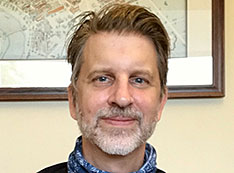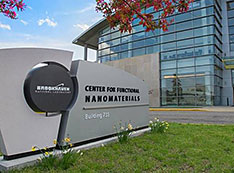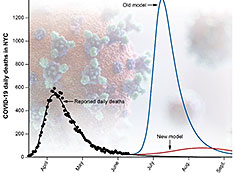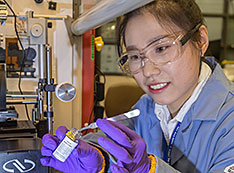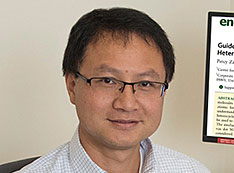A Message from Chuck Black
insights from the CFN Director
September 22, 2020
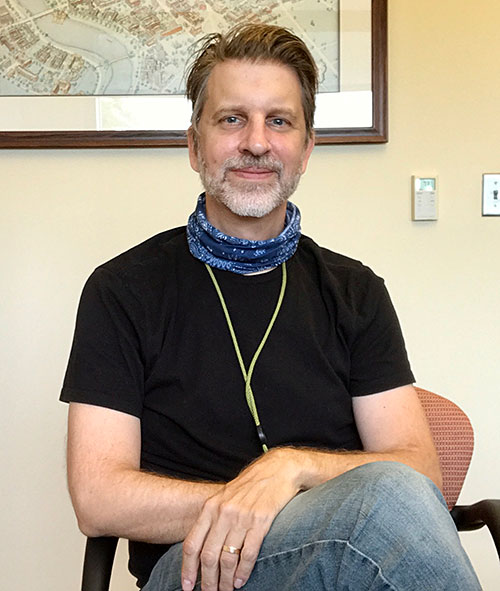
Chuck Black
Recently, I have been thinking a lot about endurance—not only because of the ongoing fight against SARS-CoV-2 but also because of the importance of perseverance in scientific research. We frequently hear about endurance in the context of sports, with marathoners, triathletes, cyclists, and cross-country skiers described as endurance athletes. However, endurance applies to many activities outside the world of sports as well.
Endurance describes the ability to withstand sustained hardship or adversity, often during prolonged efforts in pursuit of a goal. As this description makes clear, enduring something is not easy! It’s often physically or mentally painful. For this reason, endurance is a trait that’s universally admired. When we meet people who have endured something, we respect them.
It’s probably not surprising that a characteristic so widely valued is also heavily studied. What gives someone endurance? Why are some people better able to persevere through prolonged hardships, relative to others? How can we strive to build our endurance, so that we may better navigate difficult challenges, such as the life disruptions caused by SARS-CoV-2?
In May, I read a New York Times article about what psychologists and social scientists conducting studies on endurance have found. In this article, the science of endurance is met with insights from successful athletes on what it means to practice endurance. You can just as easily apply the mindsets that help athletes persevere in their sports to other situations demanding endurance.
- Have patience. Acknowledge that the race will be long and hard, so that you aren’t surprised when it is. Set your expectations honestly. Understand that you will experience successes and setbacks along the pathway toward your goal. Internalizing these expectations will keep you grounded, allowing you to focus on what is happening at each moment in time.
- Pace yourself. Recognize that you’ll be on this road for a while. Resist the temptation to start fast, in an effort to get the race over with. You’ll likely pay for it later.
- Focus on the process. A long race can seem overwhelming when viewed in its entirety. Break it down into parts. Tackle each part in its turn, without looking ahead. Doing so keeps you focused on the present, even when pursuing long-term, distant goals.
- Remember your purpose. Your ability to endure hardship is both physical and psychological. People continually evaluate how difficult an activity feels against their motivation to do it. Believing deeply in something makes it possible for us to persevere through much greater adversity, as compared to causes we are less dedicated to.
I find it helpful to think about these concepts when facing a challenging situation, especially the one we are all experiencing with SARS-CoV-2. Let’s acknowledge that the road back to a normal life will be hard. We must pace ourselves and allow time to get there. This fight will not be won overnight.
Along the way, let’s focus on exhibiting behaviors that will help us to our goal, such as wearing masks, practicing social distancing, and avoiding unnecessary exposure. Most importantly, let’s remember why we are enduring these hardships—to keep our friends, families, and ourselves safe and healthy. What’s more important than that?
Thinking about endurance reminded me that athletes aren’t the only people trained to persevere through adversity. Scientists also have well-developed traits of endurance, honed through years of practice. Scientific research is a long, difficult pathway filled with breakthroughs, puzzles, and heartbreaks. We understand well the principles of endurance and how to overcome adversity in our work, because we do it every day.
And it is through this lens, as I reflect back on this challenging year so far, that I feel special pride in the determination and dedication of CFN staff and users, who continue to carry out our important work during these difficult days. We have several accomplishments to be proud of this year:
- Last spring, on very short notice and under stressful conditions, we transitioned the CFN to minimum safe operations, placing our facility in standby and monitoring instruments so that at the appropriate time we could quickly resume operations.
- In May, staff and users held the first-ever virtual NSLS-II & CFN Users’ Meeting on the originally scheduled date, with eight workshops and more than 1,500 registered attendees from 37 countries—five times more attendees than ever before.
- This summer, CFN staff worked together to develop new protocols and practices to control the SARS-CoV-2 workplace hazard. If you’ve returned to work in the CFN, you have already seen these practices implemented and learned them. Staff are eager to teach our new procedures to all CFN users upon their first visits back.
- In June, the CFN restarted support for onsite user operations! If you are a user who is ready to return to work in CFN, talk with your staff point of contact, and we will arrange your training and schedule your first visit.
- In August, CFN held its annual summer open house for the general public as part of Brookhaven Lab’s Summer Sunday program. The online format this year offered a virtual tour of CFN facilities and a live question-and-answer session with CFN scientists, moderated by our Users’ Executive Committee Chair.
- This summer, we launched a new initiative, Remote@CFN, which will enhance our ability to provide remote use of CFN facilities so that users and staff can continue advancing their research, even during times when travel is difficult. You’ll be hearing much more about our exciting plans as we start offering these new mechanisms for remote facility use.
Endurance is hard. Endurance hurts. But people endure when what’s at stake is important to them. Winning the fight against SARS-CoV-2 will take time, but because our way of life is so important, we will endure the necessary hardships to ensure a safe and healthy future.
However, even while we persevere together, CFN staff and users have important nanoscience research to accomplish. The CFN is open for business, and staff are hard at work supporting user science, both remotely and in person. As always, we are ready to help you achieve your nanoscience research goals. So, let’s get going.
— Chuck Black
CFN Director
2020-17445 | INT/EXT | Newsroom




